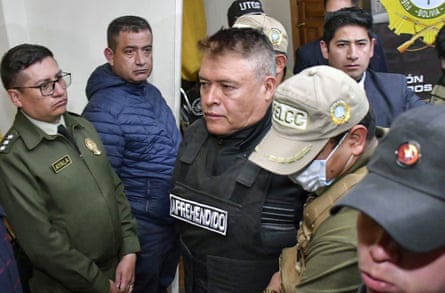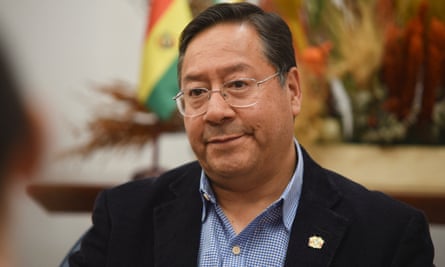A Bolivian former army chief accused of leading a failed coup attempt has been given six months “preventive detention”, a top prosecutor said on Friday, as the president again denied the attack was a “self-coup” designed to boost his flagging popularity.
General Juan José Zúñiga Macías has been handed charges of terrorism and armed uprising, state prosecutor Cesar Siles said. Zúñiga has said he was following an order from the president, Luis Arce, following Wednesday’s fleeting insurrection in La Paz. In the moments before he was detained, the ex-army chief claimed: “The president told me the situation was fucked and that he needed something to boost his popularity.”.
If Zúñiga is found guilty, the terrorism charge can be punished by 15-20 years in prison, and five to 15 years for armed uprising.

Prosecutor Siles said the attorney general’s office had requested the six months detention for Zúñiga and that other government bodies, including the defence ministry and interior ministry, supported the request “due to the importance and seriousness of the events that occurred”.
“This preventive detention that the judge is ordering will undoubtedly set a precedent and a good signal so that this investigation can continue to advance,” Siles said.
In an interview with the Associated Press, Arce denied once again that the attack on the government palace was a “self-coup”, saying: “I didn’t escape, I stayed to defend democracy.”
Arce claimed on Friday that Zúñiga had intended to take over the government and become president after Wednesday’s events, in which heavily armed troops stormed the government palace in La Paz before beating a retreat.
Wednesday’s brief and still poorly explained mutiny, which lasted only about three hours and reportedly saw 12 people injured, was the latest convulsion to grip a notoriously volatile nation that has witnessed 190 revolutions and coups since it gained independence in 1825.
Bolivia, a landlocked country of about 12.5 million citizens, is enduring a punishing economic crisis with gas exports plummeting and social unrest on the rise. To make matters worse, a bitter power struggle is playing out between Arce and Evo Morales, the former president who helped elect him in 2020. Both men have said they plan to seek the presidency in next year’s election for their party, the Movimiento al Socialismo (Mas).
In his AP interview, Arce denied the Andean country was experiencing an economic crisis, while also saying the infighting with Morales had snarled legislative activities and hamstrung his government’s efforts to confront economic problems.
Arce said the government “has taken action” to address intermittent gasoline and dollar shortages and other hurdles ailing the South American country’s economy.
“Bolivia has an economy that’s growing. An economy in crisis doesn’t grow,” he said.

Arce said his administration was working to “diversify” means of producing, investing in things such as lithium and industrialisation. Bolivia has the largest reserves of lithium in the world, which have gone largely untapped, in part due to government policy.
With Associated Press and Reuters
Source: theguardian.com


